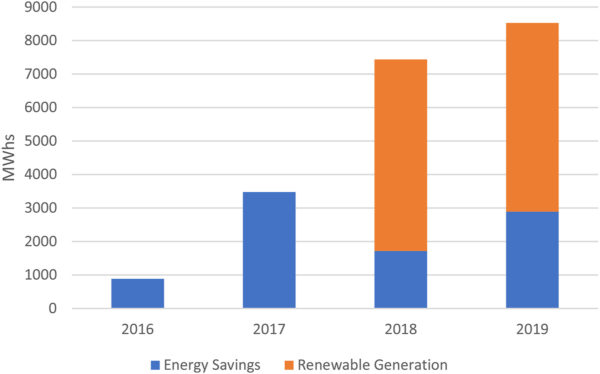Electric franchise agreements between municipalities and utilities offer a direct pathway for cities to achieve their clean energy and decarbonization goals across 30 states, according to NREL.
Research from the National Renewable Energy Lab (NREL) published in Energy Policy highlights the pivotal role cities can play in negotiating franchise agreements with utilities to further their clean energy and decarbonization goals. In recent years, a growing number of municipalities have developed ambitious clean energy goals and targets for emissions. These local governments can wield significant influence over energy consumption and operations in their jurisdictions. Researchers from the NREL argue that city-utility franchise agreements offer an immense policy opportunity.
A franchise agreement is a contract between a local government and a utility for access to the public right of way to install infrastructure, typically in exchange for a fee.
As seen above, local governments across 30 states can negotiate electric franchise agreements. Five states are precluded from entering a franchise agreement, two states are majority public power states, where cities may be unlikely to enter into franchise agreements, and the remaining 14 states had insufficient data to make conclusions.
Widespread adoption of franchise agreements across the local governments that can adopt them would potentially result in the development of 164 TWh to 911 TWh of renewable energy by 2030.
Already 467 cities, representing 13% of the data set, were identified as having either adopted franchise agreements or a franchise-related agreement that references one or more energy-related objectives.
These partnerships offer a range of benefits compared to other procurement options. Franchise agreements provide a collaborative approach with the city’s electric service providers that utilize the technical expertise of the utility in a particular local context. These partnerships allow the city to go beyond behind-the-meter generation options to more ambitious, and innovative measures that suit their specific needs and goals. As well, these agreements provide unique and direct policy leverage for municipalities without having to rely on the state legislature or regulatory bodies.
Franchise agreements are not without drawbacks. The municipality does not unilaterally dictate terms, meaning the utility could lower objectives through negotiation. While these agreements are legally binding contracts, clean energy objectives are often incorporated into parallel agreements which have fewer compliance protections, and may make it easier to underdeliver. Also, utilities typically pursue long-term contracts that may be 20 years in length. While there are shorter term partnership agreements possible, this hinders the availability of this option to achieve rapidly evolving clean energy objectives amidst the constantly changing energy sector. On the other hand, this means franchise agreements have the potential for lasting change once locked in.
Examples from cities like Denver, Minneapolis, and Salt Lake City, have shown rising interest in incorporating renewable energy objectives into franchise agreements. In 2006, the city of Denver, Colorado signed a 20-year franchise agreement with Xcel Energy along with a related energy efficiency agreement. As part of the agreement, Xcel Energy agreed to provide $2 million to Denver’s energy efficiency programs over the course of the agreement. From 2010 to 2018, Denver used these funds to support energy efficiency projects for over 7000 low-income households and 135 nonprofits. These residential projects resulted in cumulative energy savings of over 7000 MWh per year, and the nonprofit projects cumulatively saved over 4300 MWh.
In 2014, the City of Minneapolis and Xcel Energy signed a new 10-year franchise agreement and a Clean Energy Partnership to advance the city’s electricity goals. An important part of this was the decoupling of franchise fee rates from the agreement itself, allowing the city more flexibility to adjust rates. Additional revenue generated from this was allocated to the city’s climate, energy, and workforce programs, and totaled over $2.7 million in 2018. $800,000 of this funding went to the Green Cost Share program, run by the Minneapolis Health Department. This program supports investments toward energy efficiency, solar, and emissions reduction in commercial, industrial, and multifamily properties by matching funds, while also leveraging utility rebate programs and incentives.

As seen above, the Minneapolis Green Cost Share program resulted in significant increases to energy savings and renewable generation since 2017 because of the franchise agreement.
In 2016, Salt Lake City, Utah and Rocky Mountain Power signed a new five-year franchise agreement and a Cooperation Statement outlining the two entities’ renewable energy commitments. Joint goals included transitioning to at least net-50% renewable electricity for municipal facility operations by 2020, and net-100% renewable electricity supply community-wide by 2032. This franchise agreement helped push Rocky Mountain Power to request proposals for 205 GWh per year of new renewable energy generation in 2019.
These local examples highlight some of the ways franchise agreements can be used by municipalities as a direct pathway to achieve their renewable energy and decarbonization goals. At the same time, these agreements help utilities achieve greater collaboration and foster innovation in a framework that enables long-lasting and productive engagement toward shared goals. While landmark policy like the Inflation Reduction Act has incited significant clean energy investment, successful implementation will ultimately depend on the action of local governments.




